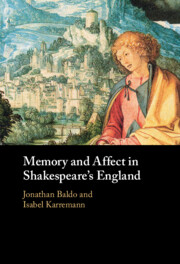18 results
Introduction
-
-
- Book:
- Memory and Affect in Shakespeare's England
- Published online:
- 07 June 2023
- Print publication:
- 27 July 2023, pp 1-22
-
- Chapter
- Export citation
Part II - The Politics of Memory and Affect
-
- Book:
- Memory and Affect in Shakespeare's England
- Published online:
- 07 June 2023
- Print publication:
- 27 July 2023, pp 87-140
-
- Chapter
- Export citation
Index
-
- Book:
- Memory and Affect in Shakespeare's England
- Published online:
- 07 June 2023
- Print publication:
- 27 July 2023, pp 308-316
-
- Chapter
- Export citation
Part IV - Memory, Affect, and Stagecraft
-
- Book:
- Memory and Affect in Shakespeare's England
- Published online:
- 07 June 2023
- Print publication:
- 27 July 2023, pp 199-268
-
- Chapter
- Export citation
Part III - Affective Memory
-
- Book:
- Memory and Affect in Shakespeare's England
- Published online:
- 07 June 2023
- Print publication:
- 27 July 2023, pp 141-198
-
- Chapter
- Export citation
Contributors
-
- Book:
- Memory and Affect in Shakespeare's England
- Published online:
- 07 June 2023
- Print publication:
- 27 July 2023, pp viii-xiii
-
- Chapter
- Export citation
Figures
-
- Book:
- Memory and Affect in Shakespeare's England
- Published online:
- 07 June 2023
- Print publication:
- 27 July 2023, pp vii-vii
-
- Chapter
- Export citation
Bibliography
-
- Book:
- Memory and Affect in Shakespeare's England
- Published online:
- 07 June 2023
- Print publication:
- 27 July 2023, pp 283-307
-
- Chapter
- Export citation
Contents
-
- Book:
- Memory and Affect in Shakespeare's England
- Published online:
- 07 June 2023
- Print publication:
- 27 July 2023, pp v-vi
-
- Chapter
- Export citation
Coda
-
- Book:
- Memory and Affect in Shakespeare's England
- Published online:
- 07 June 2023
- Print publication:
- 27 July 2023, pp 269-282
-
- Chapter
- Export citation
Copyright page
-
- Book:
- Memory and Affect in Shakespeare's England
- Published online:
- 07 June 2023
- Print publication:
- 27 July 2023, pp iv-iv
-
- Chapter
- Export citation
Acknowledgments
-
- Book:
- Memory and Affect in Shakespeare's England
- Published online:
- 07 June 2023
- Print publication:
- 27 July 2023, pp xiv-xiv
-
- Chapter
- Export citation
Part I - Ars memoriae, ars amatoria
-
- Book:
- Memory and Affect in Shakespeare's England
- Published online:
- 07 June 2023
- Print publication:
- 27 July 2023, pp 23-86
-
- Chapter
- Export citation

Memory and Affect in Shakespeare's England
-
- Published online:
- 07 June 2023
- Print publication:
- 27 July 2023
Chapter 2 - Spiritual Accountancy in the Age of Shakespeare
- from Part I - The Arts of Remembering Death
-
-
- Book:
- Memory and Mortality in Renaissance England
- Published online:
- 06 October 2022
- Print publication:
- 13 October 2022, pp 45-60
-
- Chapter
- Export citation
Sounding Otherness in Early Modern Drama and Travel: Uncanny Vibrations in the English Archive. Jennifer Linhart Wood. New Transculturalisms, 1400–1800. London: Palgrave Macmillan, 2019. xxii + 374 pp. €67.82.
-
- Journal:
- Renaissance Quarterly / Volume 74 / Issue 3 / Fall 2021
- Published online by Cambridge University Press:
- 24 September 2021, pp. 972-973
- Print publication:
- Fall 2021
-
- Article
- Export citation
Staging Harmony: Music and Religious Change in Late Medieval and Early Modern English Drama. Katherine Steele Brokaw. Ithaca: Cornell University Press, 2016. xviii + 274 pp. $65.
-
- Journal:
- Renaissance Quarterly / Volume 70 / Issue 4 / Winter 2017
- Published online by Cambridge University Press:
- 20 November 2018, pp. 1618-1619
- Print publication:
- Winter 2017
-
- Article
- Export citation
Andrew Mattison. The Unimagined in the English Renaissance: Poetry and the Limits of Mimesis. Madison: Fairleigh Dickinson University Press, 2013. vii + 174 pp. $65. ISBN: 978–1–61147–597–5.
-
- Journal:
- Renaissance Quarterly / Volume 66 / Issue 3 / Fall 2013
- Published online by Cambridge University Press:
- 20 November 2018, pp. 1122-1123
- Print publication:
- Fall 2013
-
- Article
- Export citation



